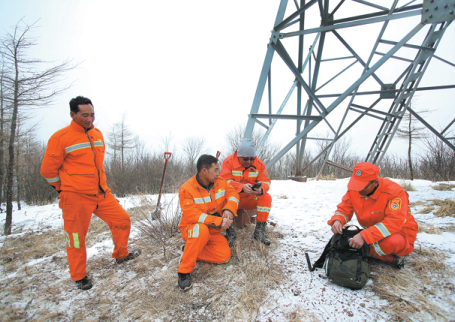Rangers on patrol protect Mount Liupan from fires


Four rangers from Madiwan station on Liupan Mountain take a break near a watch tower during a patrol. JIA HAOCHENG/XINHUA
Teams manage simple lives while manning 76 forestry stations in Ningxia region
YINCHUAN-After a snowfall cast a white blanket on Liupan Mountain, Yan Xiaoyuan-in bright orange and with a shovel in his hand, a water tank on his back and a pair of binoculars around his neck-began his daily patrol.
It was his 25th Lunar New Year on Liupan. A difference in altitude of about 2,500 meters between Yan's workplace and home has left him no other choice but to join the family reunion via video call.
"We must be more alert, especially during Spring Festival, to make sure the forests are safe and sound," said Yan, 46. His parents used to work in local forest protection departments and thus understand his absence.
Liupan Mountain, crossing the Ningxia Hui autonomous region, is known as a green island on a plateau and a natural water tower, and it is rich in plant and animal resources.
Therefore, firefighting is extremely important on the mountain on dry winter days. There are more than 240 rangers in the Liupan forestry bureau of the city of Guyuan. They have been guarding the mountain year-round since 1958 and are on duty around the clock at 76 forestry stations.
With houses renovated and solar panels, TVs and Wi-Fi installed in recent years, living conditions in the stations, including Yan's Madiwan station, have been greatly improved. But food and water still need to be supplied from time to time.
Hui Jitang, 42, has been delivering supplies to Madiwan about once a week for six years. He needs to drive about 40 kilometers, more than half of which is unpaved, posing great challenges when it snows or rains.
"It's very dangerous to drive along the slippery road. If you are trapped midway, a mobile phone without any signal will leave you helpless," Hui said. "But I have always managed to meet their needs, even during festivals and holidays."
Yan and his three colleagues are responsible for an area of about 4,000 hectares. They depart at 8 am and end work at 5 pm, patrolling 20 km or so over areas where humans tread, such as entrances to the mountain, to detect fire hazards. They also need to protect wild animals from poachers and observe the forest situation from the tower every three hours.
"Life here is simple but also a little bit dull, so we tell jokes or sing folk songs to keep things fresh," said Ma Hongming, who has been a forest ranger for just three months.
Every time Ma comes across rare wildlife, such as leopards or golden pheasants, he is filled with excitement.
"I've seen wild boars several times. But I'm not very scared, because they only hurt people when they feel threatened," Ma said.
Binoculars, a shovel and water tank are the necessary tools when rangers patrol on the mountain. But now each of them is equipped with a hand-held terminal that can report fires, capture photos of rare wild animals or call for help.
"It's easy and helpful, and all we need to do is press the button," Yan said.
Such technologies have been widely applied in forest firefighting in recent years. The Liupan forestry bureau also installed a real-time monitoring system to monitor indicators including the number of cars and people on the mountain, wind direction and temperature to ensure forest safety.
"Thanks to the rangers and technological means, the seven-month fire-prone season seems to be less difficult to overcome. But we still need to improve our emergency capacity," said Jing Wenke, deputy director of the bureau's firefighting center.
Jing said amateur and professional firefighting teams have been set up to improve emergency command. Apart from patrol work, the firefighters also take part in frequent training.
As returning migrant workers increase every year during Spring Festival, posing higher risks, Yan and his colleagues have become even busier these days.
"Nearby villagers are used to burning paper money as a tribute to the deceased during Spring Festival, so we have to persuade them to burn it in a bucket and wait until the flames go out," Yan said.
Because of his job, Yan spends much more time with his colleagues than his own family. "We treat each other like family, so we don't feel that lonely during a festival for family reunions," Yan said.
Xinhua
- Avalanche in Xinjiang leaves one dead
- Research ward at children's hospital in Shanghai treats over 200 patients with rare diseases
- Chongqing symposium examines planning cities around sound, smell, touch
- Former Qingdao legislature chief under investigation
- Former Xinjiang prosecutor Guo Lianshan under investigation
- Shandong and SCO discuss trade, investment and supply chain cooperation





































